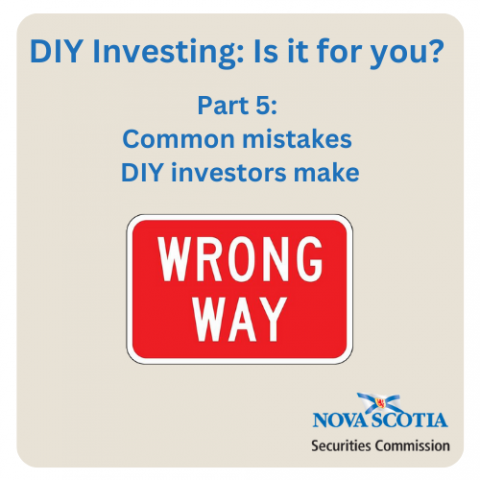Submitted by nsscadmin on

Our series on DIY investing continues with a look at some of the common mistakes made by DIY investors. These mistakes can lead to potential investment losses, and cause investors to miss hitting their investment goals.
Failing to research investments: Last week we went over some of the fundamentals of stock picking which focused heavily on research. A lack of concrete research can often lead to poor investment choices.
Not setting financial goals: It’s hard to make an investment plan if you don’t know where you’re going. Goals allow an investor to determine what is and what isn’t a suitable investment.
Choosing and holding unsuitable investments: Choosing investments that are not suitable for your situation and goals often cause investors to fall short of those goals.
Not knowing or following your risk tolerance: Investing without paying attention to your risk tolerance can be harmful to your financial and mental health.
Having too many, or too few investments: There is often a sweet spot when it comes to how many investments you hold in your portfolio. Too few investments may mean you’re not diversified enough and can be harmed by volatility. Too many investments can leave you stretched too thin with the money you have invested which can hurt your returns.
Not paying attention to investment fees: A one percent difference in fees can make a major difference in your returns over time. Make sure you know what your fees are and if they are reasonable when compared to your investment performance.
Not monitoring investment performance: If you’re a long-term DIY investor you likely won’t need to check in on your portfolio daily. However, if you’re managing the portfolio alone you will need to be monitor it regularly to determine if any changes are necessary.
Following social media and online investing trends: In our previous post we mentioned that doing research online can be a part of your investment research. However, that doesn’t mean every Facebook and Redditt post you see that recommends an investment should be followed. Many fraudsters and scam artists use social media and the web to orchestrate pump and dump schemes or other frauds. Always consider the source of an online investment recommendation and check validity and do some background research before buying or selling anything.
Next week we’ll conclude our look at DIY investing series by reviewing some of the cognitive biases that may be affecting your DIY investing behavior.
